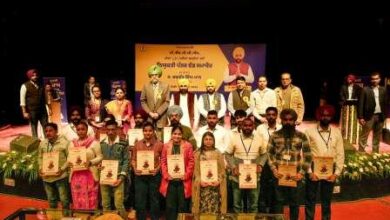India now in the league of best-performing countries with FSSAI’s revolutionary policy limiting trans fats to 2% in all oils, fats by Jan 2022 for healthier India- Hussan Lal

FSSAI’s new policy limits trans fats to 2% in all oils and fats by Jan 2022, a way forward for healthy Punjab
CHANDIGARH: Principal Secretary Health, Punjab, Hussan Lal applauded FSSAI’s, new policy and said that India is now in the league of best-performing countries like Brazil and Turkey with Food Safety and Standards Act of India’s new revolutionary policy limiting trans fats to 2% in all oils and fats by Jan 2022 for healthier India. He added that, our state is having a high prevalence of high blood pressure, high cholesterol, and high blood sugar; and we have been making efforts to reduce the use of Trans fatty acids by creating awareness about its ill-effect on the health of the people with the support of PGIMER Chandigarh and Civil Society organisations.
The Food Safety and Standards Authority of India (FSSAI) has recently announced that all edible refined oils, vanaspati, bakery shortening, margarine, vegetable fat spreads and mixed fat spreads may only contain 3% or less trans fats by January 2021 and 2% or less trans fats by January 2022. This is a critical step as World Health Organization (WHO) has called for the global elimination of trans fat by 2023.
Consumption of trans fats is associated with an increased risk of heart diseases. “It is estimated that the 2017 global market volume of partially hydrogenated oils – the main source of industrially-produced trans-fatty acids in food – was approximately 13.6 million tonnes,” says Dr Sonu Goel, Professor, Department of Community Medicine and School of Public Health, PGIMER, Chandigarh.
“Eliminating industrially-produced trans-fatty acids can save 17 million lives over the next 25 years. Regulation and enforcement are the only ways to remove this toxic ingredient from the supply,” added Dr Goel.
Dr Rakesh Gupta, President, Strategic Institute of Public Health Education and Research (SIPHER) informed that according to 2017 estimates, India has the highest burden of heart disease deaths due to high trans fat intake out of all countries in the world. In Punjab, partially hydrogenated vegetable oils (PHVOs) contributes almost 80% of total TFA intake. According to NSSO data 2011-12, the North Indian states had a higher consumption rate of Vanaspati in India. Punjab was the highest consumer in both urban and rural populations followed by Chandigarh and Delhi respectively”. Consumer organizations leaders have also welcomed the new regulations passed by FSSAI.
“Trans fats are artificially created toxins. This regulation is crucial to eliminating TFAs at source and will contribute to improving the heart health of citizens. To make sure health benefits are as great as possible, FSSAI needs to develop a strong enforcement plan including surveillance of oils and fats for trans fats, enhancing the capacity of food safety officers and improving lab capacities for testing trans fats”, says Dr Poonam Khanna, Associate Professor of Nutrition, Department of Community Medicine & School of Public Health, PGIMER, Chandigarh.
Dr Om Prakash Bera, Country Coordinator, Global Health Advocacy Incubator, working relentlessly on this issue said that, WHO’s REPLACE second annual report released in September 2020, around 40 countries have already enacted the best practice policies to eliminate trans fats. These best practice policies limit industrially produced levels of trans fats to 2% or less of total fats in all foods.
“We commend FSSAI for enacting this regulation and setting an example for the South Asian region. It is important now that FSSAI enacts the same regulation in foods and focus on the enforcement in edible oil and food industries to reach the goal of trans fats-free India by 2022,” said Dr Jagmeet Madan National President Indian Dietetic Association.
“The trans fats limit regulation is in line with FSSAI’s regulation to support a healthy India, and also supports the Eat Right India movement — a flagship program focusing on safe, healthy and sustainable food environment,” says Mr Arun Singhal, CEO, FSSAI, “The Eat Right India movement has been recognized as one of the world’s most aspiring program by Rockefeller Foundation.”




